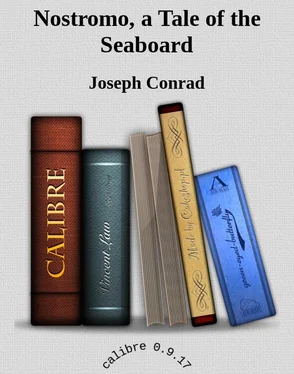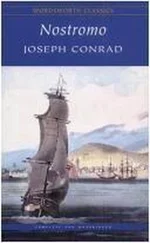Joseph Conrad - Nostromo, a Tale of the Seaboard
Здесь есть возможность читать онлайн «Joseph Conrad - Nostromo, a Tale of the Seaboard» весь текст электронной книги совершенно бесплатно (целиком полную версию без сокращений). В некоторых случаях можно слушать аудио, скачать через торрент в формате fb2 и присутствует краткое содержание. Жанр: Старинная литература, на английском языке. Описание произведения, (предисловие) а так же отзывы посетителей доступны на портале библиотеки ЛибКат.
- Название:Nostromo, a Tale of the Seaboard
- Автор:
- Жанр:
- Год:неизвестен
- ISBN:нет данных
- Рейтинг книги:4 / 5. Голосов: 1
-
Избранное:Добавить в избранное
- Отзывы:
-
Ваша оценка:
- 80
- 1
- 2
- 3
- 4
- 5
Nostromo, a Tale of the Seaboard: краткое содержание, описание и аннотация
Предлагаем к чтению аннотацию, описание, краткое содержание или предисловие (зависит от того, что написал сам автор книги «Nostromo, a Tale of the Seaboard»). Если вы не нашли необходимую информацию о книге — напишите в комментариях, мы постараемся отыскать её.
Nostromo, a Tale of the Seaboard — читать онлайн бесплатно полную книгу (весь текст) целиком
Ниже представлен текст книги, разбитый по страницам. Система сохранения места последней прочитанной страницы, позволяет с удобством читать онлайн бесплатно книгу «Nostromo, a Tale of the Seaboard», без необходимости каждый раз заново искать на чём Вы остановились. Поставьте закладку, и сможете в любой момент перейти на страницу, на которой закончили чтение.
Интервал:
Закладка:
A voice remarked loudly, "Behold a man who will never speak again." And another, from the back row of faces, timid and pressing, cried out—
"Why did you kill him, mi colonel?"
"Because he has confessed everything," answered Sotillo, with the hardihood of desperation. He felt himself cornered. He brazened it out on the strength of his reputation with very fair success. His hearers thought him very capable of such an act. They were disposed to believe his flattering tale. There is no credulity so eager and blind as the credulity of covetousness, which, in its universal extent, measures the moral misery and the intellectual destitution of mankind. Ah! he had confessed everything, this fractious Jew, this bribon. Good! Then he was no longer wanted. A sudden dense guffaw was heard from the senior captain—a big-headed man, with little round eyes and monstrously fat cheeks which never moved. The old major, tall and fantastically ragged like a scarecrow, walked round the body of the late Senor Hirsch, muttering to himself with ineffable complacency that like this there was no need to guard against any future treacheries of that scoundrel. The others stared, shifting from foot to foot, and whispering short remarks to each other.
Sotillo buckled on his sword and gave curt, peremptory orders to hasten the retirement decided upon in the afternoon. Sinister, impressive, his sombrero pulled right down upon his eyebrows, he marched first through the door in such disorder of mind that he forgot utterly to provide for Dr. Monygham's possible return. As the officers trooped out after him, one or two looked back hastily at the late Senor Hirsch, merchant from Esmeralda, left swinging rigidly at rest, alone with the two burning candles. In the emptiness of the room the burly shadow of head and shoulders on the wall had an air of life.
Below, the troops fell in silently and moved off by companies without drum or trumpet. The old scarecrow major commanded the rearguard; but the party he left behind with orders to fire the Custom House (and "burn the carcass of the treacherous Jew where it hung") failed somehow in their haste to set the staircase properly alight. The body of the late Senor Hirsch dwelt alone for a time in the dismal solitude of the unfinished building, resounding weirdly with sudden slams and clicks of doors and latches, with rustling scurries of torn papers, and the tremulous sighs that at each gust of wind passed under the high roof. The light of the two candles burning before the perpendicular and breathless immobility of the late Senor Hirsch threw a gleam afar over land and water, like a signal in the night. He remained to startle Nostromo by his presence, and to puzzle Dr. Monygham by the mystery of his atrocious end.
"But why shot?" the doctor again asked himself, audibly. This time he was answered by a dry laugh from Nostromo.
"You seem much concerned at a very natural thing, senor doctor. I wonder why? It is very likely that before long we shall all get shot one after another, if not by Sotillo, then by Pedrito, or Fuentes, or Gamacho. And we may even get the estrapade, too, or worse—quien sabe?—with your pretty tale of the silver you put into Sotillo's head."
"It was in his head already," the doctor protested. "I only—"
"Yes. And you only nailed it there so that the devil himself—"
"That is precisely what I meant to do," caught up the doctor.
"That is what you meant to do. Bueno. It is as I say. You are a dangerous man."
Their voices, which without rising had been growing quarrelsome, ceased suddenly. The late Senor Hirsch, erect and shadowy against the stars, seemed to be waiting attentive, in impartial silence.
But Dr. Monygham had no mind to quarrel with Nostromo. At this supremely critical point of Sulaco's fortunes it was borne upon him at last that this man was really indispensable, more indispensable than ever the infatuation of Captain Mitchell, his proud discoverer, could conceive; far beyond what Decoud's best dry raillery about "my illustrious friend, the unique Capataz de Cargadores," had ever intended. The fellow was unique. He was not "one in a thousand." He was absolutely the only one. The doctor surrendered. There was something in the genius of that Genoese seaman which dominated the destinies of great enterprises and of many people, the fortunes of Charles Gould, the fate of an admirable woman. At this last thought the doctor had to clear his throat before he could speak.
In a completely changed tone he pointed out to the Capataz that, to begin with, he personally ran no great risk. As far as everybody knew he was dead. It was an enormous advantage. He had only to keep out of sight in the Casa Viola, where the old Garibaldino was known to be alone—with his dead wife. The servants had all run away. No one would think of searching for him there, or anywhere else on earth, for that matter.
"That would be very true," Nostromo spoke up, bitterly, "if I had not met you."
For a time the doctor kept silent. "Do you mean to say that you think I may give you away?" he asked in an unsteady voice. "Why? Why should I do that?"
"What do I know? Why not? To gain a day perhaps. It would take Sotillo a day to give me the estrapade, and try some other things perhaps, before he puts a bullet through my heart—as he did to that poor wretch here. Why not?"
The doctor swallowed with difficulty. His throat had gone dry in a moment. It was not from indignation. The doctor, pathetically enough, believed that he had forfeited the right to be indignant with any one—for anything. It was simple dread. Had the fellow heard his story by some chance? If so, there was an end of his usefulness in that direction. The indispensable man escaped his influence, because of that indelible blot which made him fit for dirty work. A feeling as of sickness came upon the doctor. He would have given anything to know, but he dared not clear up the point. The fanaticism of his devotion, fed on the sense of his abasement, hardened his heart in sadness and scorn.
"Why not, indeed?" he reechoed, sardonically. "Then the safe thing for you is to kill me on the spot. I would defend myself. But you may just as well know I am going about unarmed."
"Por Dios!" said the Capataz, passionately. "You fine people are all alike. All dangerous. All betrayers of the poor who are your dogs."
"You do not understand," began the doctor, slowly.
"I understand you all!" cried the other with a violent movement, as shadowy to the doctor's eyes as the persistent immobility of the late Senor Hirsch. "A poor man amongst you has got to look after himself. I say that you do not care for those that serve you. Look at me! After all these years, suddenly, here I find myself like one of these curs that bark outside the walls—without a kennel or a dry bone for my teeth. Caramba! " But he relented with a contemptuous fairness. "Of course," he went on, quietly, "I do not suppose that you would hasten to give me up to Sotillo, for example. It is not that. It is that I am nothing! Suddenly—" He swung his arm downwards. "Nothing to any one," he repeated.
The doctor breathed freely. "Listen, Capataz," he said, stretching out his arm almost affectionately towards Nostromo's shoulder. "I am going to tell you a very simple thing. You are safe because you are needed. I would not give you away for any conceivable reason, because I want you."
In the dark Nostromo bit his lip. He had heard enough of that. He knew what that meant. No more of that for him. But he had to look after himself now, he thought. And he thought, too, that it would not be prudent to part in anger from his companion. The doctor, admitted to be a great healer, had, amongst the populace of Sulaco, the reputation of being an evil sort of man. It was based solidly on his personal appearance, which was strange, and on his rough ironic manner—proofs visible, sensible, and incontrovertible of the doctor's malevolent disposition. And Nostromo was of the people. So he only grunted incredulously.
Читать дальшеИнтервал:
Закладка:
Похожие книги на «Nostromo, a Tale of the Seaboard»
Представляем Вашему вниманию похожие книги на «Nostromo, a Tale of the Seaboard» списком для выбора. Мы отобрали схожую по названию и смыслу литературу в надежде предоставить читателям больше вариантов отыскать новые, интересные, ещё непрочитанные произведения.
Обсуждение, отзывы о книге «Nostromo, a Tale of the Seaboard» и просто собственные мнения читателей. Оставьте ваши комментарии, напишите, что Вы думаете о произведении, его смысле или главных героях. Укажите что конкретно понравилось, а что нет, и почему Вы так считаете.












